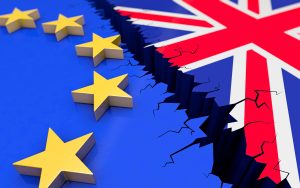
After more than 40 years of operation, DTVE is closing its doors and our website will no longer be updated daily. Thank you for all of your support.
Brexit report highlights ‘reciprocity gaps’ for broadcast business
 A report on the impact of Brexit on the audiovisual media industry compiled by the European Audiovisual Observatory has highlighted the ‘reciprocity gaps’ that are likely to arise between the UK-based industry and EU-based counterparts after the UK leaves the EU.
A report on the impact of Brexit on the audiovisual media industry compiled by the European Audiovisual Observatory has highlighted the ‘reciprocity gaps’ that are likely to arise between the UK-based industry and EU-based counterparts after the UK leaves the EU.
In the event of an agreement being signed, the first gap that will emerge is between UK and EU-headquartered broadcasters, according to the report. While UK-based broadcasters will have to either relocate or select a second home country within the EU, broadcasters in the remaining EU member states will continue to benefit from Audiovisual Media Services Directive protection in the UK, because while UK law will reflect EU laws, EU member states will treat the UK as a third country.
Similarly, while the mandatory collective licensing provisions applicable to cable retransmission in the EU’s SatCab Directive will continue to benefit EU broadcasters, retransmissions of UK originated content will need to be cleared individually, potentially on a territory-by-territory basis.
In addition, while a rule that provides for a single point of clearance for satellite broadcasts based on the ‘place of uplink’ will cease to apply to UK satellite broadcasters, potentially forcing them to uplink from an EU state, EU originated broadcasts will continue to be treated as cleared for the UK.
In the event of a no deal exit, says the report, copyright will remain protected by international treaties but the UK will cease to benefit from cross-border mechanisms that provide reciprocal protection to EU member states.
Audiovisual media services are typically not subject to international treaties, and a no deal exit would imply that the UK would no longer benefit from the ‘country of origin principle’, meaning that EU countries could prevent retransmission of services on UK territory, according to the report.
The UK’s continued membership of the European Convention on Transfrontier Television of the Council of Europe would mean that UK services could continue to be made available in the 20 ECTT countries. These include most EU countries but do not include Belgium, Denmark, Greece, Ireland, Luxembourg, the Netherlands and Sweden, for which a new licence would be required by services based in the UK.
UK treatment of non-ECTT broadcasters in the event of no deal has not yet been clarified, but the UK has committed to enable reception of Irish channels TG4, RTÉ1 and RTÉ2.
The report also points to a couple of loopholes that could theoretically benefit UK-based companies in the event of no deal. First, the ECTT does not cover video-on-demand services, and while content produced in the UK would continue to qualify as European for EU quota purposes – because the definition of European works in the Audiovisual Media Services Directive refers to the ECTT – the UK would not be obliged to abide by EU quotas applicable to VOD catalogues because the ECTT doesn’t cover these services.
Additionally, it points out that UK-based channels using satellite capacity of an ECTT signatory state could theoretically be allowed to transmit to EU member states without an EU licence.


